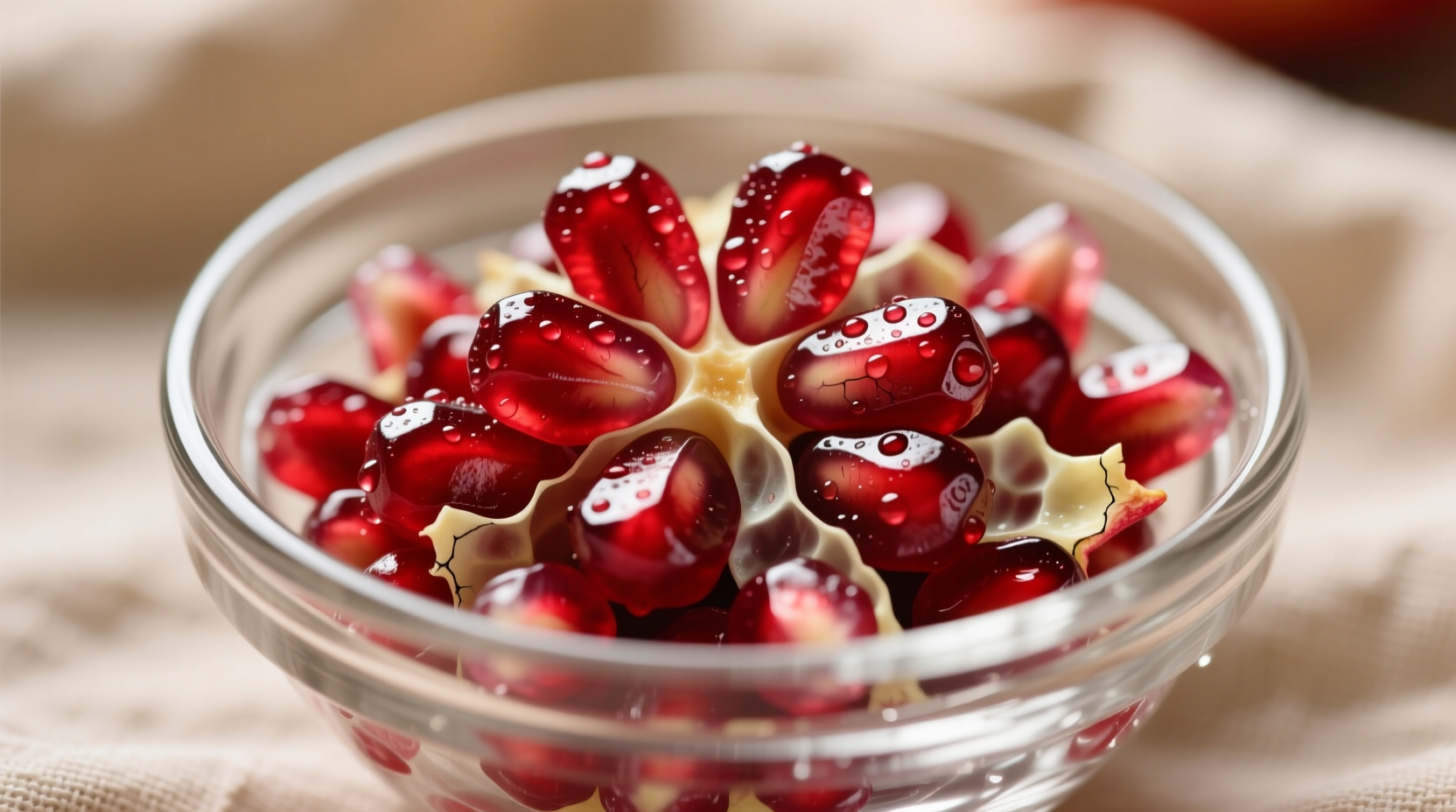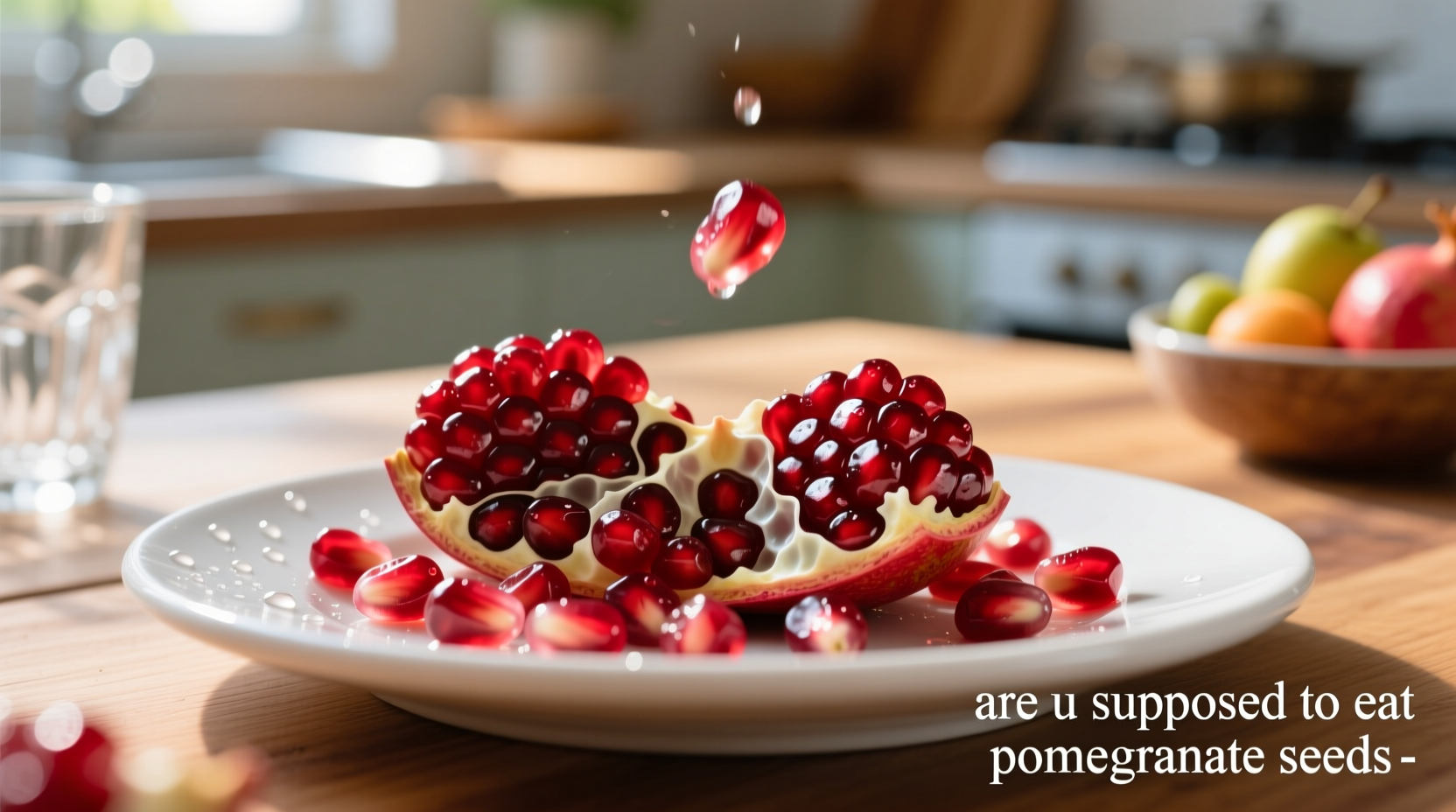Yes, you absolutely should eat pomegranate seeds—they're completely edible and packed with nutrients. The entire aril (seed plus juicy sac) is safe to consume, providing fiber, antioxidants, and vitamin C. Unlike some fruit seeds that contain toxins, pomegranate seeds offer significant health benefits without risks for most people.
The Complete Guide to Eating Pomegranate Seeds Safely and Deliciously
Many people hesitate before biting into those ruby-red pomegranate jewels, wondering if they're supposed to spit out the seeds like watermelon or swallow them whole. The truth? Pomegranate seeds are not only edible but represent one of nature's most potent superfoods. Let's clear up the confusion once and for all.
Why People Question Eating Pomegranate Seeds
The confusion stems from two main factors: texture preferences and misinformation. Unlike citrus fruits where we discard the peel and pith, or stone fruits where we avoid the pit, pomegranates present a unique structure. The edible portion consists of the aril—the juicy sac surrounding each seed. Many first-time eaters mistakenly believe they should only consume the juice sac and discard the seed, when in reality, both components provide nutritional value.
According to the USDA FoodData Central, the seed itself contains valuable fiber and healthy fats that contribute to the fruit's overall nutritional profile. Research published in the Journal of Agricultural and Food Chemistry confirms that pomegranate seeds contain punicic acid, a conjugated linolenic acid with potential anti-inflammatory properties.
Nutritional Powerhouse: What Makes Pomegranate Seeds Special
When you eat pomegranate seeds, you're consuming one of the most antioxidant-rich foods available. A single pomegranate contains approximately 65% of your daily vitamin C needs, 30% of your vitamin K, and significant amounts of folate and potassium. But the real star is punicalagin, an antioxidant unique to pomegranates that's been shown to have three times the antioxidant activity of red wine or green tea.
| Nutrient | Per 100g Seeds | Daily Value % |
|---|---|---|
| Calories | 83 kcal | 4% |
| Fiber | 4g | 14% |
| Vitamin C | 10.2mg | 11% |
| Vitamin K | 16.4μg | 14% |
| Potassium | 236mg | 5% |
These nutritional values come directly from USDA FoodData Central (FDC ID #170182), representing the complete edible portion including seeds. The fiber content alone makes swallowing the seeds worthwhile, as it contributes to digestive health and helps regulate blood sugar.
How to Eat Pomegranate Seeds Properly
Now that we've established you should eat pomegranate seeds, let's discuss the best ways to enjoy them:
Extraction Techniques
- Underwater method: Cut the pomegranate in half and submerge in a bowl of water. Gently loosen the seeds—they'll sink while the white pith floats.
- Roll and tap method: Score the skin, roll on a hard surface to loosen seeds, then tap with a spoon over a bowl.
- Knife method: Score the skin into sections, then carefully break apart over a bowl to catch falling seeds.

Culinary Applications
Once extracted, incorporate pomegranate seeds into your diet with these practical approaches:
- Breakfast boost: Sprinkle over oatmeal, yogurt, or avocado toast
- Salad superstar: Toss with mixed greens, goat cheese, and walnuts
- Protein partner: Add to chicken or fish dishes for texture contrast
- Smoothie secret: Blend whole for added fiber and texture
- Simple snack: Enjoy by the handful straight from the fruit
When to Exercise Caution with Pomegranate Seeds
While pomegranate seeds are safe for most people, certain individuals should exercise caution:
- Dental concerns: Those with dental implants or braces might find the crunchy texture problematic
- Digestive sensitivity: People with diverticulitis historically were advised to avoid seeds, though recent research suggests this restriction may be unnecessary for most cases
- Medication interactions: Pomegranate can interact with certain blood pressure medications and blood thinners
The National Center for Complementary and Integrative Health notes that while pomegranate is generally safe, those taking medications for high blood pressure or cholesterol should consult their healthcare provider before consuming large amounts regularly.
Debunking Common Pomegranate Myths
Let's address some persistent misconceptions about pomegranate seeds:
- Myth: You should only eat the juice sac and spit out the seed
Fact: Both components provide nutritional value—the seed contains fiber and healthy fats - Myth: Pomegranate seeds cause appendicitis
Fact: No scientific evidence supports this claim—the myth likely stems from confusion with other seeds - Myth: The white pith is edible
Fact: While not toxic, the pith is extremely bitter and generally discarded
How Much Should You Eat Daily?
For optimal benefits without overconsumption, registered dietitians generally recommend:
- One whole pomegranate (about 1 cup of seeds) provides sufficient daily antioxidants for most adults
- Those new to pomegranates might start with 1/4 cup to assess digestive tolerance
- Maximum recommended: 2 cups daily for therapeutic benefits in specific health conditions
Research from the National Institutes of Health indicates that consuming approximately 150-200ml of pomegranate juice (equivalent to one fruit's worth of seeds) daily shows measurable health benefits in clinical studies.
Storing Pomegranate Seeds for Maximum Freshness
Proper storage maintains both flavor and nutritional value:
- Short-term: Store extracted seeds in an airtight container in the refrigerator for up to 5 days
- Long-term: Freeze seeds on a baking sheet, then transfer to freezer bags for up to 6 months
- Pro tip: Add a teaspoon of lemon juice to refrigerated seeds to prevent oxidation and maintain color
Studies show that frozen pomegranate seeds retain nearly 90% of their antioxidant content for up to six months when properly stored, making freezing an excellent option for enjoying off-season.
Final Verdict: Embrace the Crunch
After examining the evidence from nutritional science, culinary tradition, and food safety research, the conclusion is clear: yes, you're absolutely supposed to eat pomegranate seeds. Not only are they safe to consume, but they represent the most nutrient-dense portion of this ancient superfruit. The satisfying crunch delivers fiber, healthy fats, and concentrated antioxidants that work synergistically with the juice sacs to provide maximum health benefits.
Whether you're sprinkling them over salads, blending them into smoothies, or simply enjoying them by the handful, embracing the whole aril—seed and all—is the key to unlocking pomegranate's complete nutritional profile. So next time you crack open this jewel-toned fruit, don't hesitate to crunch—your body will thank you.











 浙公网安备
33010002000092号
浙公网安备
33010002000092号 浙B2-20120091-4
浙B2-20120091-4